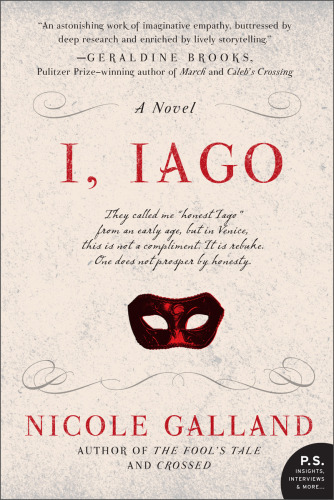
I, Iago
کتاب های مرتبط
- اطلاعات
- نقد و بررسی
- دیدگاه کاربران
نقد و بررسی

April 1, 2012
Galland (Crossed, 2008, etc.) takes on one of literature's greatest villains and tries to make him sympathetic. For a large part of the novel--until the introduction of Othello when events from Shakespeare's play take over--she succeeds. As the fifth son of a Venetian silk merchant, Iago has limited prospects. His precociousness and his growing reputation for blunt honesty don't help in a society where insipid, phony etiquette is prized if not required. He spends his childhood getting into mild scrapes with his poorer, weaker friend Roderigo, whom he is always protecting, before his father enrolls him in the military. There he finds himself and excels. He meets Emilia at a Venetian masked ball and falls in love with her wit and intelligence even before he learns she is beautiful. Despite Iago's bouts of jealousy, theirs is a marriage of soul mates. Emilia remains his (and the novel's) heart and conscience to the end. Meanwhile the Moor Othello has been named General by the Venetian senate. When Othello and Iago meet at a ball, they immediately connect, recognizing that they are both outsiders who don't really want to fit into society, Iago for his mouth and Othello for his black skin. Othello makes Iago his ensign, an important promotion. After the battle at Rhodes, Othello suffers an epileptic fit and Iago covers for him. So when Othello falls for Desdemona, Iago is understandably hurt and jealous that he is left out of the loop as the romance develops with Emilia's help. Then an alcoholic, womanizing fop from Florence shows up; Cassio lacks Iago's military skills but because he carries secret letters between the general and Desdemona he gets the lieutenancy that should go to Iago. Resentment turns the love Iago has felt for Othello into hate. Although Iago doesn't really mean to kill anyone, he's not good at intrigue. Familiar Shakespearean tragedy ensues. Too bad the switch from empathetic protagonist into villain is not quite believable, because until then Iago and Emilia are magic.
COPYRIGHT(2012) Kirkus Reviews, ALL RIGHTS RESERVED.

April 15, 2012
Shakespeare's "Othello" is a classic tragedy with its eternal themes of race, jealousy, and betrayal. This is the second novel about the play's villain, Iago, to be published recently. In the other book, "Iago", writer David Snodin imagines a sequel to the action in the play, as Iago is hunted down on Cyprus. In this new work, by a cofounder of the Shakespeare for the Masses project, Iago tells his own story, starting with his childhood in Venice, his military career, and his love for his wife, Emilia. Galland ends the story where Shakespeare does, with violence and death in Desdemona's chamber. Although densely packed with vivid details about life in 16th-century Venice, this novel is very readable. The steady pace accelerates dramatically as Iago's schemes rapidly spiral out of control and end in tragedy. VERDICT A convincing portrayal of a tormented, delusional man whose complicated web of deceit destroys everyone around him.--Leslie Patterson, Rehoboth, MA
Copyright 2012 Library Journal, LLC Used with permission.

























دیدگاه کاربران